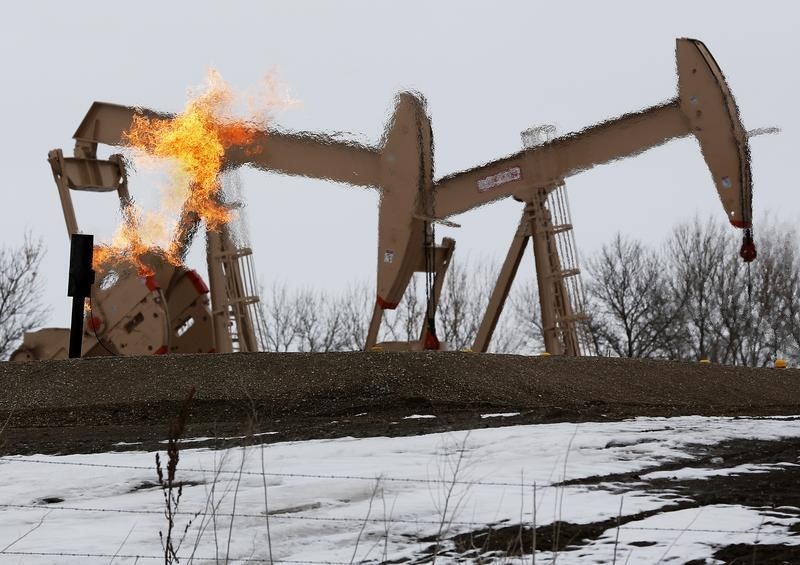By Dmitry Zhdannikov and Ron Bousso
LONDON (Reuters) - Oil executives warned on Tuesday of a "dramatic" decline in U.S. production that could pave the way for a future spike in prices if fuel demand increases.
Delegates at the Oil and Money conference in London, an annual gathering of senior industry officials, said world oil prices were now too low to support U.S. shale oil output, the biggest addition to world production over the last decade.
"We are about to see a pretty dramatic decline in U.S. production growth," the former head of oil firm EOG Resources Mark Papa, told the conference.
Papa, now a partner at U.S. energy investment firm Riverstone (LONDON:RSER) Holdings LLC, said U.S. oil production would stall this month and begin to decline from early next year. He said the main reason for the decline would be a lack of bank financing for new shale developments.
Official data show that nationwide U.S. output has already begun to decline after reaching a peak of 9.6 million barrels per day (bpd) in April, although production in some big shale patches, including North Dakota, has held steady thus far. The Energy Information Administration forecast on Tuesday that output would reach a low of around 8.6 million bpd next year.
Until this year, U.S. oil output was growing at the fastest rate on record, adding around 1 million bpd of new supply each year thanks to the introduction of new drilling techniques that have released oil and gas from shale formations.
But oil prices have almost halved in the last year on oversupply in a drop that deepened after the Organization of the Petroleum Exporting Countries in 2014 changed strategy to protect market share against higher-cost producers, rather than cut output to prop up prices as it had done in the past.
Benchmark Brent crude was up 5 percent, or $2.50 a barrel, at $51.75 on Tuesday as investors digested news from the London conference. It peaked in recent years above $115 a barrel in June 2014.
SPIKE
The chief executive of Royal Dutch Shell (LONDON:RDSa) Plc agreed, saying U.S. oil producers would struggle to refinance while prices remained so low, leading to lower output in future.
"Producers are now looking for new cash to survive and they will probably struggle to get it," Ben van Beurden said.
Longer term, there was a risk that low levels of global production could bring a spike in oil prices, he said.
If prices remained low for a long time and oil production outside OPEC and the United States declined due to capital expenditure cuts, there was not likely to be any significant spare capacity left in the system, he said.
"This could cause prices to spike upwards, starting a new cycle of strong production growth in U.S. shale oil and subsequent volatility," van Beurden said.
Adam Sieminski, administrator at the U.S. Energy Information Administration, told reporters on the sidelines of the conference the U.S. oil industry had reacted to lower prices by improving its productivity.
But this process could not continue forever.
"Now we are seeing the limits at least in the near term and it is beginning to impact production," Sieminski said. "We see (U.S. oil production declines) continuing into next summer."
The Secretary-General of OPEC, Abdullah al-Badri, said oil supply growth from non-OPEC producers might be zero or negative in 2016 because of lower upstream investment.
But Papa said if U.S. light crude oil prices went back up to $75 a barrel, U.S. oil production would resume growth at around 500,000 bpd - or around half the record growth rates observed in the past few years.

"I see the United States as a long-term growth producer," he said. "If low oil prices prevail - then the correction in oil prices will be much more severe."